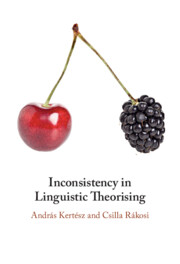Book contents
- Inconsistency in Linguistic Theorising
- Inconsistency in Linguistic Theorising
- Copyright page
- Dedication
- Contents
- Figures
- Tables
- Preface
- Abbreviations and central terms
- 1 Introduction
- Part I The State of the Art
- Part II Paraconsistency
- Part III Plausible Argumentation
- 6 From Paraconsistency to Plausible Argumentation
- 7 Inconsistency and Theory Change
- 8 The Treatment of Inconsistency in Optimality Theory
- 9 The Heuristics of Inconsistency Resolution
- Part IV Summary
- References
- Index
8 - The Treatment of Inconsistency in Optimality Theory
from Part III - Plausible Argumentation
Published online by Cambridge University Press: 23 June 2022
- Inconsistency in Linguistic Theorising
- Inconsistency in Linguistic Theorising
- Copyright page
- Dedication
- Contents
- Figures
- Tables
- Preface
- Abbreviations and central terms
- 1 Introduction
- Part I The State of the Art
- Part II Paraconsistency
- Part III Plausible Argumentation
- 6 From Paraconsistency to Plausible Argumentation
- 7 Inconsistency and Theory Change
- 8 The Treatment of Inconsistency in Optimality Theory
- 9 The Heuristics of Inconsistency Resolution
- Part IV Summary
- References
- Index
Summary
This chapter provides a survey of the most frequent methods of the treatment of inconsistencies in Optimality Theory (OT).raises the problem of whether our findings in the preceding chapters can be supported by the analysis of a linguistic theory that makes conscious and deliberate use of inconsistencies.will provide a brief overview of the basic ideas of OT. In , we will reveal the types of inconsistency in Optimality Theory with the help of an instructive case study without applying the terminology and the notation of the p-model. Some passages of René Kager’s argumentation in connection with the introduction of two correspondence constraints will be presented, which are quite simple but seem to be especially illuminating concerning the emergence and the treatment of inconsistencies in OT. In , we will analyse the structure and the treatment of these inconsistencies with the help of the p-model.will infer the solution to the problem mentioned.
Keywords
- Type
- Chapter
- Information
- Inconsistency in Linguistic Theorising , pp. 231 - 266Publisher: Cambridge University PressPrint publication year: 2022



